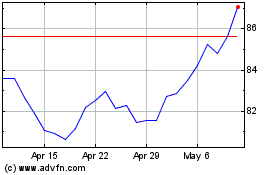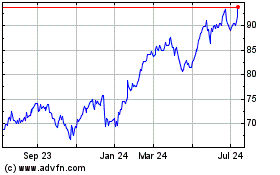UPDATE: Aon To Take Commissions Once Banned Under Spitzer
July 21 2010 - 2:37PM
Dow Jones News
Insurance broker Aon Corp. (AON) said Wednesday it will accept,
with some self-imposed restrictions, a form of compensation that
for a while was banned after former New York Attorney General Eliot
Spitzer mounted a campaign against the payments in 2004.
Aon joins rival Marsh & McLennan Cos. (MMC) in deciding to
accept contingent commissions, after New York's insurance regulator
allowed the practice earlier this year. The two firms, along with
smaller rival Willis Group Holdings PLC, had been banned from
accepting them for about five years.
Insurance brokers match the companies that buy insurance with
the sellers of the coverage, and since the contingents were banned,
the three brokers have been paid only by the buyers for that
service. Smaller brokers such as Brown & Brown Inc. (BRO) have
continued to take the commissions from insurers, raising questions
about whether the ban created an uneven playing field for brokers.
The size of the commissions can be linked to factors including how
profitable the policy is for the insurance company.
Spitzer had argued the contingent payments amounted to secret
kickbacks, and the three companies agreed to stop accepting them in
2005 in a settlement with the New York Attorney General's office
that applied worldwide. Under an agreement reached with New York
regulators in February, the three leading brokers agreed to
disclose the fees to their clients as a condition for lifting of
the ban.
Marsh & McLennan said in March its large and middle-market
operations in the U.S. and Canada wouldn't take the payments, but
it would accept contingent commissions elsewhere.
Aon wasn't as specific in a statement released Wednesday.
"We have decided to accept various forms of compensation
available, which may include supplemental and/or contingent
commissions in the geographies and client segments globally where
appropriate and legally permissible," said Steve McGill, chairman
and chief executive of Aon Risk Solutions.
Willis has said the payments raise the question of whether the
broker is acting in the best interest of its clients, and launched
a website (clientsbeforecontingents.com) to argue against the
practice and promote the fact that its retail brokerage doesn't
take contingents.
"Not only do contingents have the potential to affect the
loyalty and service insurance buyers get from their brokers, they
also negatively impact the image of our industry," Willis Chief
Executive Joe Plumeri said in a statement Monday.
Still, a brokerage that Willis acquired in 2008, Hilb Rogal
& Hobbs, continues to accept the payments. The latest Willis
annual report said that, for some of its clients, "existing
agreements will remain in force for so long as permitted by the
regulatory authorities or until the commissions are converted" to a
different fee structure that compensates for the contingent
revenue.
In 2004, contingent commissions accounted for 2.5% of Aon's
revenue, compared with 9.7% for Marsh & McLennan and 3.1% for
Willis, according to data compiled by Citigroup analyst Keith
Walsh. It was zero for the two larger brokers last year, and 1.5%
for Willis, presumably from its HRH unit.
-By Erik Holm, Dow Jones Newswires; 212-416-2892;
erik.holm@dowjones.com
Brown and Brown (NYSE:BRO)
Historical Stock Chart
From Apr 2024 to May 2024

Brown and Brown (NYSE:BRO)
Historical Stock Chart
From May 2023 to May 2024
